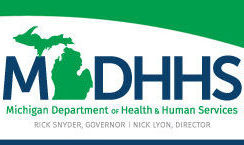Traumatic brain injury (TBI) and acquired brain injury (ABI) are the leading cause of injury-related deaths and disability in the United States. To bring awareness to this often-preventable injury, March has been declared Brain Injury Awareness Month. Falls, motor vehicle accidents and sports-related trauma are leading causes of TBIs and the Michigan Department of Health and Human Services (MDHHS) is urging residents to learn about injury prevention strategies to keep themselves and their families safe. An ABI is a form of brain injury that an individual sustains, or acquires, after birth. This includes TBIs and medical issues as a stroke. A TBI is any injury that occurs to the brain. It is caused by a bump, blow or jolt to the head or a penetrating head injury that disrupts the normal function of the brain. TBIs may affect cognitive function, motor function, sensation and emotional function. “Prevention strategies can greatly reduce the risk for traumatic brain injuries and death,” said Robert Gordon, MDHHS director. “This can include removing hazards in and around the home such as rugs and clutter in walkways, keeping sports safe by wearing protective gear including helmets and always wearing a seatbelt while in a vehicle.” Nationally, the total cost of emergency department visits, hospitalizations and deaths related to traumatic brain injuries, either alone or in combination with other injuries, exceeds $76.5 billion annually. In 2017, 11,585 people in Michigan were hospitalized for a TBI. Among Michigan residents who died of an injury, 1,748 had a TBI listed as an underlying or contributing cause of death on the death certificate. Observable signs of traumatic brain injury may include appearing dazed or stunned, forgetting an instruction, moving clumsily, answering questions slowly, losing consciousness, showing mood, behavior or personality changes and being unable to recall events prior to and/or after a hit or fall. For more information on TBIs, visit Cdc.gov/traumaticbraininjury. For more tips to keep your home safe, visit Cpsc.gov, and Safekids.org. More information about sports concussions is available at Michigan.gov/sportsconcussion. Additional resources for seniors for classes to prevent falls and improve mobility and independence may be found at Greatatanyagemi.com.


